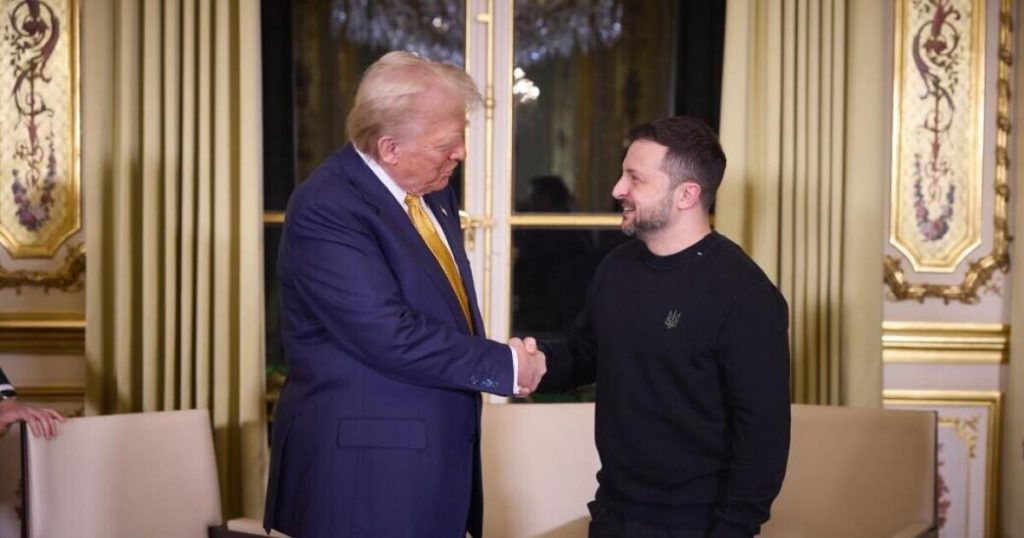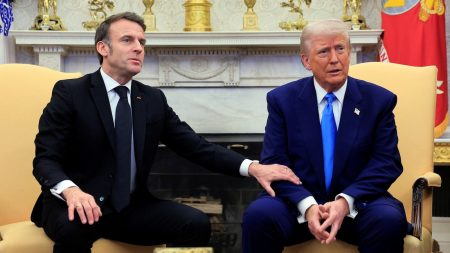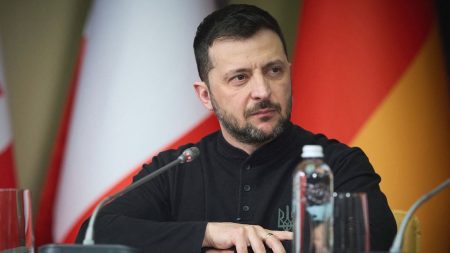Strategic Negotiations in the Final Stages: A New Chapter for U.S.-Ukraine Relations
Three years after Russia launched its full-scale invasion of Ukraine, the country is nearing a historic agreement with the United States. Under pressure from former President Donald Trump, Ukraine is in the final stages of negotiations that would grant the U.S. access to its vast mineral reserves. This deal is being framed by Ukrainian leaders as a potential cornerstone for long-term security guarantees against future Russian aggression. However, the Trump administration has been cautious in committing to such guarantees, instead emphasizing the economic benefits of the agreement for both nations.
Olga Stefanishcha, Ukraine’s Vice President for European and Euro-Atlantic Integration, expressed optimism about the negotiations, stating that nearly all key details have been finalized. She highlighted Ukraine’s commitment to swiftly completing the agreement and expressed hope that both U.S. and Ukrainian leaders could sign the deal in Washington soon. This agreement could symbolize a decades-long commitment between the two nations, marking a new era of cooperation.
Ukraine’s Mineral Wealth and Its Significance
Ukraine is often referred to as Europe’s "breadbasket" due to its vast agricultural resources, but it is also one of the continent’s most resource-rich countries. The nation boasts significant reserves of rare earth elements (REEs), titanium, lithium, and graphite, which are critical for modern industries such as defense, aerospace, energy, and technology. However, much of Ukraine’s mineral wealth remains untapped due to challenges like outdated infrastructure, lack of investment, and the ongoing Russian military campaign.
Approximately 20% of Ukraine’s land, including the eastern Donbas region and Crimea, is under Russian control. These occupied territories hold a substantial portion of Ukraine’s mineral reserves, including rare earth elements, which are highly sought after for their role in advanced technologies. Ukraine is believed to hold about 5% of the world’s rare earth reserves, compared to the U.S., which holds only 1-2%. Ukraine also has one of Europe’s largest reserves of titanium, a key component in aircraft and missiles, as well as significant deposits of lithium, used in rechargeable batteries, and graphite, essential for industrial lubricants.
The Strategic Importance of Ukraine’s Resources
The strategic significance of Ukraine’s mineral wealth cannot be overstated. Rare earth elements, in particular, are crucial for the production of advanced defense systems, renewable energy technologies, and electronic devices. The U.S. currently relies heavily on China for these materials, which raises national security concerns. By gaining access to Ukraine’s reserves, the U.S. could reduce its dependence on China and strengthen its global supply chain.
For Ukraine, the deal offers not only economic benefits but also the potential for enhanced security guarantees. Ukrainian leaders, including President Volodymyr Zelenskyy, have made it clear that any agreement must include commitments to protect the country from future Russian aggression. Zelenskyy has emphasized that Ukraine’s natural resources are a "very important element" in the structure of its security guarantees.
Ukraine’s Push for Security Guarantees
President Zelenskyy has been firm in his stance on the terms of the agreement. He has refused to sign any deal that could disproportionately benefit the U.S. while leaving Ukraine vulnerable. Earlier, he rejected a proposed agreement that would have granted the U.S. access to approximately $500 billion worth of Ukraine’s mineral reserves—about half of their estimated future value. Zelenskyy argued that such a deal would burden future generations of Ukrainians, stating, "I won’t sign a document that 10 generations of Ukrainians will pay for."
Instead, Zelenskyy has called for any mineral deal to include security guarantees, potentially even the deployment of U.S. forces to protect American investments in Ukraine. This reflects Ukraine’s broader strategy of leveraging its resources to strengthen its position on the global stage and secure its future against Russian threats.
Trump’s Perspective on the Deal
Former President Donald Trump has framed the potential agreement as a way for Ukraine to reciprocate the U.S. for its military and economic support over the past three years. Trump has claimed that the U.S. has provided Ukraine with $350 billion in assistance since the start of the war, though independent estimates suggest the actual figure is around $183 billion, with a significant portion spent domestically in the U.S. on weapons and equipment for Ukraine.
Trump has emphasized the economic and strategic benefits of the deal for the U.S., stating, "We must have an agreement with Ukraine on critical minerals and rare earths and various other things as security." He has also hinted at the possibility of meeting with Zelenskyy at the White House to finalize the deal. For Trump, the agreement represents an opportunity to diversify U.S. supply chains and reduce reliance on China, while also ensuring that Ukraine remains a key partner in countering Russian influence.
Reactions and Implications of the Potential Agreement
The potential mineral deal has sparked significant interest and debate, both domestically and internationally. French President Emmanuel Macron, during a recent visit to Washington, acknowledged the importance of the discussions, highlighting their economic and strategic implications. Macron emphasized the potential for mutual economic benefits and the opportunity to strengthen ties between the U.S. and Ukraine.
However, not all reactions have been positive. Critics have raised concerns about the transparency of the negotiations and the potential imbalance in the terms of the agreement. Some have questioned whether the deal adequately addresses Ukraine’s security needs, while others have pointed to the risks of overly commercializing Ukraine’s resources at a time when the country is still engaged in a















